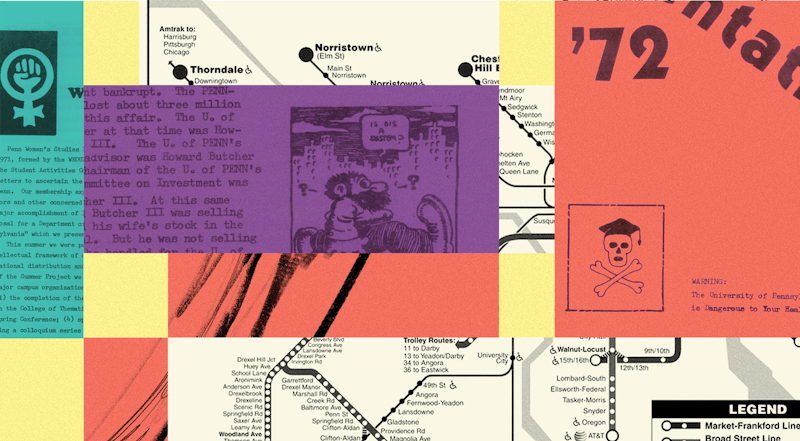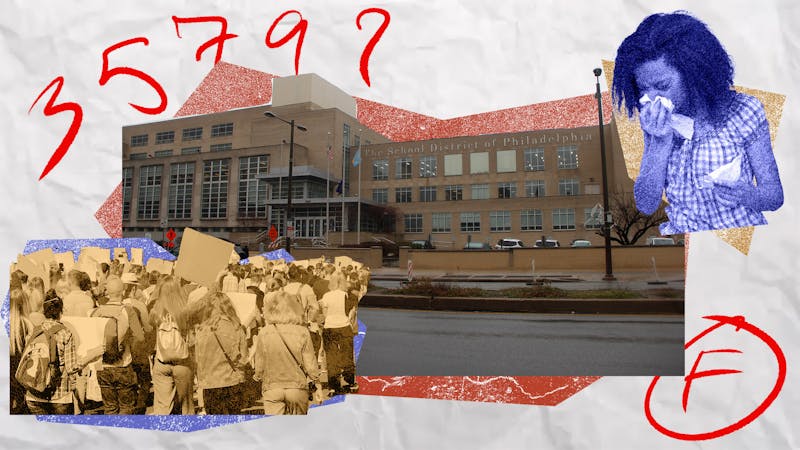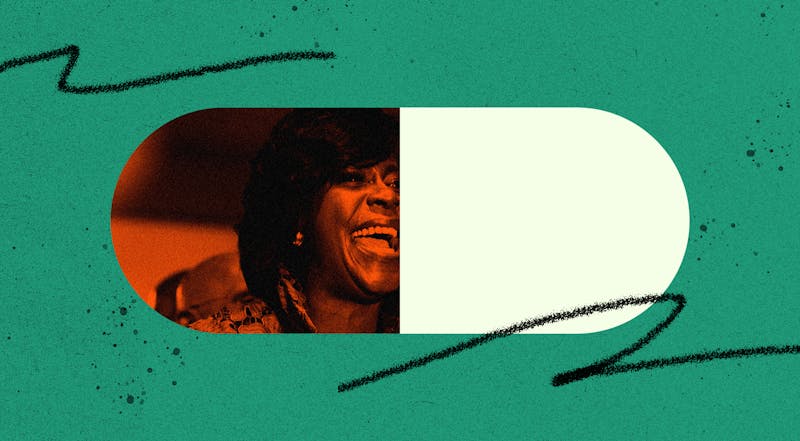On the afternoon of April 25, the Gaza Solidarity Encampment was set in motion. Earlier that day, a protest—organized by the Philly Palestine Coalition—began at City Hall and marched its way throughout Philadelphia, arriving at Penn’s campus by 4 p.m. It culminated with protesters pitching about 20 tents on College Green, with the support of an organized faculty walkout. The encampment, joining an ongoing international struggle, began.
Penn’s encampment wasn’t an isolated incident. Rather, it was the product of growing tension on campuses throughout the country surrounding the war in Gaza. In the lead up to the encampment, Penn revoked Penn Students Against the Occupation of Palestine’s club status on April 19; soon after, Penn’s Muslim Student Association and Penn’s Israel Public Affairs Committee began circulating counteractive referendums about Penn’s response to the war.
PAO’s three demands, detailed in an Instagram post, called for the University to disclose “individual and active financial holdings under the associated investments fund,” divest from both corporations and institutions that fund “Israel’s war on Gaza and occupation in Palestine,” and, finally, protect Palestinian students, their allies, and those involved with pro–Palestinian protesting “beginning with the reinstatement of Penn Students Against the Occupation.”
The morning following the encampment’s commencement, Interim Penn President Larry Jameson issued a statement stating that the University was closely monitoring the demonstration and that, while it supports open, peaceful protesting, the administration would intervene should it turn violent. However, by that night, Jameson sent an email claiming that the encampment violated Penn policies and demanded its immediate disbandment.
Throughout the first 100 hours of the encampment, student demonstrators in the encampment engaged in teach–ins, poetry readings, and art–making. 71 hours into the encampment, during one event, "Seder in the Streets"—cohosted by Jewish Voice for Peace Philadelphia, Rabbis for Ceasefire Philadelphia, Families for Ceasefire Philly, and Tikkun Olam Chavurah—pro–Israel counterprotester entered the seder event carrying a knife hoster on his belt.
Days later, a man entered the encampment spraying an "odorous substance" as described by reporting in The Daily Pennsylvanian. Encampment demonstrators described a number of early morning harrassment by counterprotestors. The Daily Pennsylvanian reported gatherings of counterprotestors at the encampment at 4 a.m. on May 5. Counterprotestors played a parodied version of a Muslim call to prayer through a megaphone, shouting phrases like "F**k Palestine," "Wake up terrorists," and "Go home," as depicted in a video posted to Instagram.
Across the country, other encampments experienced similar displays of counterprotest. Some encampments like UCLA's were met with aggressive displays of physical retaliation by counterprotestors for hours while police observed without engaging.
Back on Penn's campus, at roughly 6 a.m. on May 10, the dim sunlight threw a blanket over the treetops on College Green. Sleep deprived protesters were met with around 100 police officers in riot gear descending on campus. Thirty—three people were arrested, nine of whom were Penn students. In a statement to The Daily Pennsylvanian, a University spokesperson wrote that “Protestors were given multiple warnings that they were trespassing and offered the opportunity to voluntarily leave and avoid citation. Those who chose to stay did so knowing that they would be arrested and removed.” By 9 a.m., all those arrested had been released.
The encampment was officially disbanded after 16 days.
One week later, in the evening hours of May 17, pro–Palestinian activists attempted to occupy Fisher–Bennett Hall. Shortly after students blocked entrances to the building, Penn Police and Philadelphia Police Department forces descended on the building, arresting 19 individuals, of whom seven were identified as Penn students.
On July 2, after the academic year ended, the Freedom School for Palestine posted that a few days before, on June 27, four Penn undergraduate and graduate students were notified that they were being placed on semester–long or yearlong suspensions. Sent by Penn’s disciplinary office via letter, the group describes the suspensions as brought about by “pro–Palestinian activism on campus.” Nearly two months prior, on May 9, the DP reported that Penn had placed six students on mandatory leaves of absence for involvement with the Gaza Solidarity Encampment.
In the months since the initial arrests, students have faced ongoing disciplinary action from Penn. Student activists have declared Penn’s use of disciplinary action as means to deflect from the encampment’s demands. Distracting through flurries of emails, all the while sowing seeds of disunity and disorganization among protesters, the administration used calculated tactics to suppress the visibility of protesters on campus. Playacting good–faith negotiating, administrators quickly showed their hand, barring students from campus housing and services while emphatically requesting support from the Penn Police. Penn's handling of the encampment, the student's demands, and the disciplinary process underscores Penn administration's ability to function as a well–oiled disciplinary apparatus, quickly and effectively suppressing student voices.

A Wave of Suspensions and Disciplinary Proceedings
To some of the activists, the disciplinary notices that arrived in their inboxes came as a surprise. The charges ranged from suspensions to mandatory leaves of absence. Emma, a student that was placed on a mandatory leave of absence on May 9, describes how the encampment protesters had a more hopeful meeting with administration on May 7, only a few days prior to the disciplinary action. Jameson and Provost John Jackson, Emma notes, she felt were more optimistic about the more immediately actionable goals of the encampment, which included clarifying what genocide means to the University and allowing and supporting an independent Middle Eastern cultural space on campus.
Within 48 hours of the May 7 meeting, despite the air of the previous talks, Emma wasn’t allowed back on campus. She later received a “suspension–not–imposed” notice from Penn administration, which carries the same weight as a suspension, though without the time off of school, as she was a graduating senior. However, the punishment is still substantial and is a disciplinary mark that can be viewed by graduate schools and employers.
Emma also recounts ambiguity around whether she would be allowed to walk at graduation. With her family seated in Franklin Field, she lined up with the rest of her class on graduation day. But as she was ready to walk, Apex security officers pulled her out of line. Emma remains uncertain on how they identified her and the other two students pulled out of line, and she also is unclear on the basis of her removal.
As an undergraduate, Emma specialized in post–colonial literature. Her dedication to the subject extended beyond the classroom, and her involvement in the protests reflects her commitment to amplifying the voices of those facing colonial oppression. Among students involved in the encampment, a background in social and political issues is common. Another student demonstrator, Taja, has a deep–seated interest in political science, and her research has been recognized at Penn. While these students see a connection between their education and their activism, Penn’s disciplinary response is inherently contradictory to its reputation of marketing Penn as a hub of civic engagement and social justice scholarship.
Taja was unsurprised by the disciplinary action, as she had been facing it for months prior. Taja had been organizing with the Freedom School for Palestine and noticed an increase of visibility for the Palestine–solidarity movement both on campus and internationally. She thinks that once it became clear that the movement was a threat to Penn’s image and capital, they moved to repress the encampment, using “smoke screens of … ‘you’re disrupting campus life, you’re making students feel unsafe.’ … Just anything to basically get us out and make us invisible again.”
Rishi, a student at Temple University, recounts the brutal experience of being taken into custody by Penn Police officers in riot gear when the encampment was swept. Rishi saw fellow demonstrators around him getting thrown to the ground and injured; at least two people were sent to the hospital.
“It’s difficult for me to even walk on campus without … thinking of that [day] and thinking: This is how Penn chose to respond to us, as many of their own students, of their own community members, chose to speak out against genocide, speak out against their involvement in it,” Taja says.
All three students recount the “brutal repression” of protest and the “unprecedented” identification of protesters.
According to guidance released by the University’s Committee on Open Expression in April, University officials who request identification to make a record for “purposes of a possible disciplinary action” must state their intent to do so at the time of the request. However, students allege that throughout the encampment, administrators and Penn Police officers would enter the encampment requesting PennCards and, when asked to state whether students’ identities would be noted for disciplinary purposes, the University officials refused to clarify. Emma believes that many of the students served with the first round of disciplinary letters from the Penn Center for Community Standards and Accountability were “targeted students who they saw in the media.”
Student protesters speculate that they were recognized by their faces. During her disciplinary hearing, Emma recalls being told by Julie Nettleton, CSA’s director, that administrators “knew her”—despite having never met her or requesting to see her ID.
The pattern of alleged interactions between students and administrators “set a precedent for the way that the University interacted with [us] during the encampment,” Emma says. “The administration started very obviously pinpointing students rather than [going through] the regular steps in the Guidelines [on] Open Expression.”
Intimidation set the stage for the bad–faith negotiations and disciplinary proceedings that followed.
“The disciplinary actions were a really useful tool of distraction, from the University, and … there were points when they, very effectively, sowed seeds of disunity and disorganization among us,” Emma says. “Oftentimes [discipline] was used as almost a bartering chip to distract us from our very reasonable concerns of the University’s investments and endowment transparency.”
Taja similarly says, “With the encampment, and the yearlong build up of protests, the administration felt threatened by this visibility and the power that we were building on campus, as it was a threat to their image and capital, and in turn they had to brutally repress it.”
When considering opposition to the encampment, Taja states, “people are pulling the wool over their eyes.” She rejects condemnation of the encampment and dismisses suggestions that they should tailor their protest by engaging in non–disruptive demonstrations, ensuring that they remain under a decibel limit, and requesting pre–approval for protest space. “That’s never how any transformative change happened. It’s never how students have interacted with global movements,” she concludes.
The Gaza Solidarity Encampment is not an outlier for student protests. As recently as 2022, encampments, like that of Fossil Free Penn, have been set up on College Green. Sit–ins and other demonstrations have been a tried–and–true method of open expression in Penn student history. But it’s noted that the approach taken by the administration for the Gaza Solidarity Encampment was markedly different, as was the University’s response.
On the day the encampment was cleared, “Philadelphia Police and the University police brutally arrested students for over an hour,” Taja says. “There were … hospital visits. There were concussions, dislocated joints, fractured joints, internal bruising.”

Students weren’t the only ones to note Penn’s unconventional approach to handling student demonstrators on College Green and in negotiation rooms.
State Rep. Rick Krajewski (D–Philadelphia) (E ‘13) came to Penn’s campus multiple times during the spring semester in an attempt to mediate between student protesters and the administration.
“From the get–go, when I had heard about the encampment, I wanted to support the right of students to protest, to organize, to express their perspective on political issues,” Krajewski says. “That’s important for me, not just as an elected official, but also as an alum of Penn and as a community member in West Philadelphia. It’s also important for me as an elected official who is very concerned and horrified about the ongoing genocide and war in Gaza.”
Along with Philadelphia City Councilmembers Jamie Gauthier, Kendra Brooks, and Nicolas O’Rourke, state Sen. Nikil Saval (D–Philadelphia), and state Reps. Chris Rabb (D–Philadelphia) and Tarik Khan (D–Philadelphia), Krajewski led efforts to put forward a collective statement, calling for Penn to negotiate in good faith with the protesters, refrain from enforcing disciplinary criminal charges, and not engage violent police force in clearing the encampments. “We saw that occur in Columbia and Princeton and other campuses where there was just brutalization of student protesters, and we were deeply concerned about that occurring in Pennsylvania, at Penn,” he tells Street.
But the administration did not respond to the local government officials’ statement, according to Krajewski.
Penn’s unprecedented response to the encampment has extended beyond the disciplinary proceedings, bleeding into the 2024 fall semester with new restrictions on campus demonstrations.
On June 6, an email was sent from Jameson to all students, faculty, staff, and postdoctoral students, with the subject “Temporary Standards and Procedures for Campus Events and Demonstrations.”
The temporary guidelines are, by and large, exactly what they sound like—temporary standards for speech and expression that the members of the Penn community will be held to for the 2024–25 academic year, at the very least. Crucially, however, the temporary guidelines are not revisions on the Guidelines on Open Expression, which have not been updated in over 30 years, but rather will be acting in their place for the time being. The temporary guidelines state that they are in place to ensure “expressions of free speech are appropriately managed.”
Where the Guidelines on Open Expression left greater room for interpretation, the temporary guidelines do not—free speech is coming with a larger asterisk, limiting the time, scheduling, and locations of protest. Features of the guidelines, including clauses that allow the school to take disciplinary action in cases of online harassment and allow the restriction of filming by the press, are particularly alarming.
Krajewski critiqued the temporary guidelines, remarking, “I am concerned about the banning of encampments, because we have seen the University able to approach encampments and student protests with a less hostile tone. … The University didn’t employ police to clear the encampments [in the past]. They didn’t approach it with the same hostility as they did the protests this spring, and that’s inherently because this is a political issue.”

A Well–Oiled Disciplinary Machine
In the waning days of the spring semester, the focus on the disciplinary hearings from the University and the media buried the encampment’s original intent and demands. Lost under a mountain of bureaucracy and bad–faith negotiations with University representatives, student activists’ efforts seemed to fall to the wayside.
Moreover, the media circus around College Green eclipsed news of the conditions in Gaza. Starving Palestinians were without aid for another day, poor conditions were reported from Israeli prisons, and over 100,000 fled Rafah with the United Nations warning of a humanitarian crisis at the hands of Israel. Moreover, the Biden administration admitted that American weapons were being used in Gaza in ways “inconsistent with international humanitarian law,” according to CNN.
But throughout, the student protesters interviewed were adamant on bringing the conversation back to Palestine. The focus on bureaucracy and disciplinary actions distracts from the protest’s exigence: transparent finances, divestment from direct profiting from the war in Gaza, and the promotion of education in Gaza.
Two months after the clearing of the encampment, students face repercussions, while Israeli Prime Minister Benjamin Netanyahu continues his push into occupied territory, recently speaking at United States Congress condemning former Penn President Liz Magill. The dissonance, on the one hand, between the University’s repression of protests and lack of negotiation to meet protesters’ goals, and on the other of the horrors in Gaza, strikes a hypocritical chord for some.
“It goes to show that Penn is not really interested in ‘education, but also building global leadership, and civic engagement’ and all the things that they claim to care about,” says Taja. Student protesters, while from different backgrounds and motivated for different reasons, speak in one voice on this topic: Penn is a well–oiled disciplinary machine, efficient in an elusive bureaucratic strategy for suppressing the pro–Palestinian protests.
Disciplined students have faced backlash this summer on different fronts: some legal, some academic, and some online. Met with clashes with police, vaguely worded emails from school administrators, and the might of the internet doxxing, the students still felt an obligation to put their studies on hold, aware of the potential consequences.
Still, for students like Taja, protest is worth the disciplinary repercussions when weighed against the alternative of inaction. “[Protest has] always been how students use their education to push for change for decades, centuries,” Taja says. “If you’re not organizing, and you’re not pushing back against a place like Penn and speaking out against a genocide when it’s happening, then your education has no teeth.”
Editor's note: This article was updated from a previous print version in light of additional reporting from The Daily Pennsylvanian.





